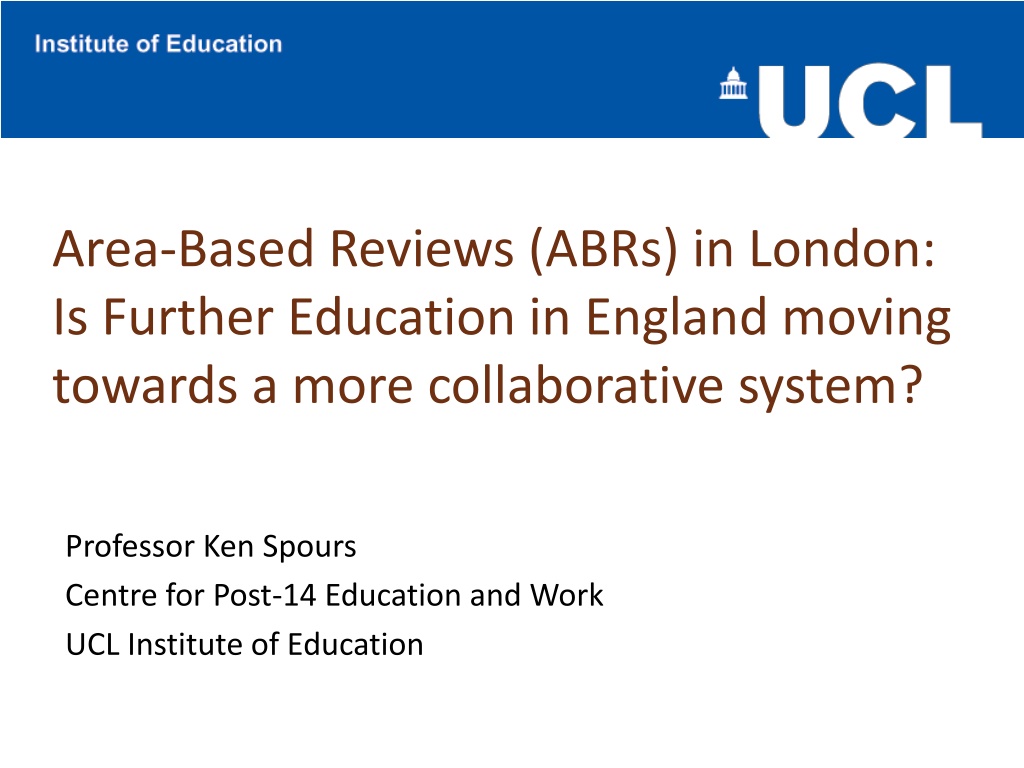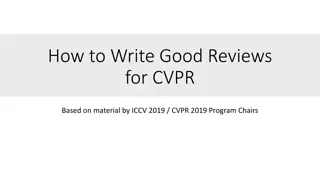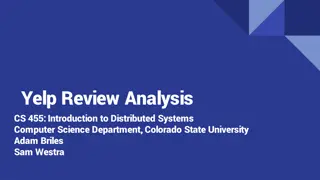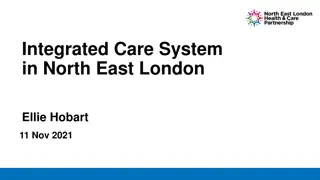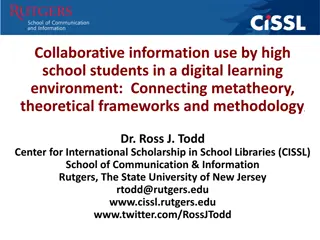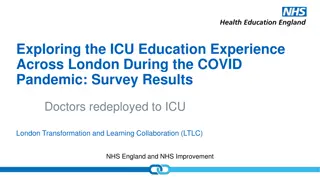Collaborative Trends in Further Education: A Study on Area-Based Reviews in London
Explore the movement towards a more collaborative system in Further Education in England, focusing on Area-Based Reviews (ABRs) in London. The presentation delves into policy backgrounds, stakeholder perceptions, and new developments from 2015 to 2018. It also examines how England compares to Scotland, Wales, and Northern Ireland, analyzing skills, employment boards, the Mayor's Skill Strategy, devolution, and infrastructure projects. The study aims to evaluate the degree of collaboration within the Further Education sector.
Download Presentation

Please find below an Image/Link to download the presentation.
The content on the website is provided AS IS for your information and personal use only. It may not be sold, licensed, or shared on other websites without obtaining consent from the author. Download presentation by click this link. If you encounter any issues during the download, it is possible that the publisher has removed the file from their server.
E N D
Presentation Transcript
Area-Based Reviews (ABRs) in London: Is Further Education in England moving towards a more collaborative system? Professor Ken Spours Centre for Post-14 Education and Work UCL Institute of Education
Aims of the presentation Present policy background to ABRs Understand the London and wider English contexts Communicate stakeholder perceptions of ABRs 2015- 2018 Provide an analytical framework Logic A and Logic B Employ home international comparison between England, Scotland, Wales and Northern Ireland Analyse new developments Skills and Employment Boards, Mayor s Skill Strategy, Devolution and major infrastructure projects Pose the question regarding the degree of movement towards a more collaborative FE system
Policy aims of the ABRs Policy of austerity, reduced public spending and improved engagement with employers Institutions which are financially viable, sustainable, resilient and efficient, and deliver maximum value for public investment. An offer that meets each area s educational and economic needs. Providers with strong reputations and greater specialisation. Sufficient access to high quality and relevant education and training for all. Provision which reflects changes in government funding priorities and future demand. Regionalisation and rationalisation of colleges has taken place in Scotland, Wales and Northern Ireland resulting a 50 per cent reduction in the number of institutions.
London: dynamic & divided Different scale to all other UK cities and growing rapidly Highly socially divided and rapidly changing demographics Economically dynamic but under-developed TVET system low levels of apprenticeships and tendency to import graduates Highly competitive post-16 education and training sector with relatively poor employer engagement Source: Skills Devolution and Area Reviews GLA Feb 2016 Housing crisis difficulties of working and living in London
ABR research approach Scoping seminar involving principals and chairs of governors (Oct 2015). Four sub-regional-based seminars with college staff involved with curriculum development (Jan-March 2016). Round 1 (April July 2016) interviews with GFE and SFC principals in each the four sub-region + chairs of the sub-regional review groups + representatives of JARDU and LGA. Round 2 (Jan March 2017) interviews with same participants Round 3 (Jan March 2018) interviews with sample of institutional leaders + all chairs of sub-regional review groups and LGA. Periodic seminars to check out findings and to gain additional data and final conference in July 2018.
ABR process in London Involved 30 GFEs, 12 SFCs and 5 specialist institutions that opted in London Area Based Review Prior to the Review about half of the FE colleges in London involved in merger or alliance-based discussions West sub- regional review Central sub- regional review South sub- regional review East sub- regional review Five meetings per sub- group Four final reports published February 2017 Wave 2 of national process Wave 3 of national process ACL review undertaken alongside
Stakeholder perceptions of ABRs College leaders merger/collaborations already underway; ABRs seen as adding to this and thus supported, but ABR process seen as cumbersome and little added value. SFC leaders initially felt marginal to ABR and would have liked to see involvement of 11-18 schools, UTCs and also review of general education provision LAs and GLA important mechanism for looking at colleges and establishing collaboration and increased engagement with employers. ABR process too rushed and too focused on financial viability and not enough on learner progression and developing local economy Curriculum leaders Concern about organisational distraction costs of planned mergers Wanted more focus on curriculum and building Pan-London professional networks Network of personal cross-college contacts Creating joint area road-maps of provision and developing progression pathways Building pan-London professional networks Providing peer review and development groups Focusing on specialisations across London Engaging with learners and employers Developing regional and sub-regional partnerships with wider stakeholders
Two logics of the ABRs Logic A Dominant process that continues logic of Incorporation Narrow focus on college economic viability and mergers Partial system approach - relative exclusion of schools; general education; the marginalisation of sixth form colleges and little input from wider stakeholders. Review process conducted as a sprint did not consider provision issues Logic B Subordinate process that signals stronger collaborative approach Comprehensive focus on the improvement of vocational specialisation; progression pathways for all; protecting and developing the whole curriculum, including general education; the engagement of wider social partners, particularly employers. A Pan-London approach with holistic citywide picture and strong cross borough and sector frameworks. A longer and more inclusive ABR process.
Historical trajectory 1993-2018 Centralised FE and LSC phase 1 (1997-2004) Early FE Incorporation (1993-1997) FE and LSC phase 2 (2004-2010) Coalition - Skills Funding Agency, new providers + use of Ofsted Private Public ABR formal phase (2016) Austerity and devolved ABR Review ABR aftermath phase London s Sub-regional Skills and Employment Boards Decentralised
Towards an English FE system? Future of Logic A and Logic B relationship Role of new sub-regional Employment and Skills Boards Devolution of budgets to city regions Mayor s Pan-London Skills Plan as framework Moving towards regionalization model?
High skills progression networks Mediation of relations from above the State Evolution of the totality of relations over time Industrial & business clusters involving a range of different types of enterprises Shared mission, values, local identity and connective networking Higher education institutions as technological & knowledge-led incubators Further education colleges as VET and progression hubs Local Mediation of relations from below the Community government economic regeneration and service provision
